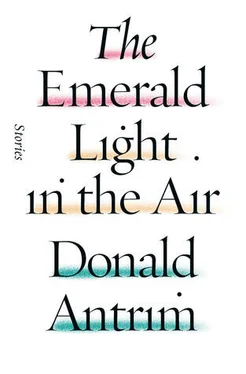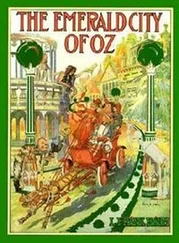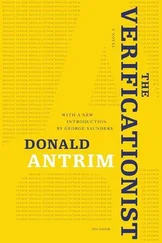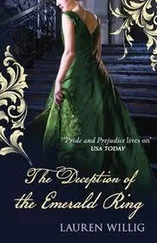She said, “Have you talked to Elliot?”
He said, “I haven’t heard from him.”
Elliot, in the meantime, had been unable to get through, Jim’s phone lines having been taken up by both their wives. He’d left two messages already, one saying, “Jim, call me, all right?”; the other, “Jim, will you call me?” His third attempt got through, but Jim didn’t answer. He heard the beeping, plucked the phone away from his ear, glanced at it, saw who was calling, and said, to Kate, “It’s him. There is no way that I want to speak to him right now.”
“I understand,” she said. Then she said, “Just get here, dear, and have dinner with us. We all need food. We need to eat.”
He said, “Has he taken care with you, since I’ve been gone?”
“Gone?” she said.
“I don’t know how else to put it.”
She asked, “Will you stay where you are, until people come?”
“Don’t send an ambulance,” he said to her.
He put his phone in his pocket. He turned and faced the door to the flower shop. A few people swept past him on the windy avenue — or so it seemed; his thoughts were with the pain beneath his temple. He wanted to put it out. He could imagine different ways to do this. This was how it was when his mind turned to high open windows or unlocked rooftop fire doors or breaks in the chain-link fences lining bridge walkways.
He took a step forward. The door was made partly of glass, and he could see into the shop. It occurred to him that it would be easy to break the window with his fist and deliberately cut up the veins in his arms. Instead, he put his hand on the doorframe and pushed. He stuck his head inside. He was acting guiltily, though he knew there was no reason to, not at the florist’s — he hadn’t done anything yet. Still, he snuck in, ashamed.
The girl was nowhere in sight. The bouquet looked bigger than it had the last time he’d sized it up. How would he manage to get it up Broadway in his trembling hands? Beside it on the table — careful, he had to be careful — were the girl’s pruning shears, as well as regular scissors and a small sharp knife.
He told himself to let those things lie.
Uptown at the restaurant, Lorenzo brought Kate her drink. She asked for bread, and apologized to him for taking so long to order dinner. “We’ll all be here together soon,” she sighed.
She was right about that. Elliot had given up trying to reach Jim, and the cold had driven him back inside. He was threading his way down the aisle to their table. Susan, too, would return, as soon as she had peed. Pride had made her unable to while on the phone.
And that left Jim, who had no desire to become a thief. Might he, instead, offer something in barter for the flowers? His wristwatch wasn’t worth much. His overcoat was brand-new, and cost well more than the watch and the bouquet combined. He decided to leave an IOU, promising to come back another day with money, or if not with actual money, then with a clear idea of when one or another of his or his wife’s credit cards might again be active and usable.
But when he tried to hold a pen in his hand, he could not; and when he tried to focus his eyes on the piece of paper lying beside the cash register — it was the scrap of a receipt on which the girl had penciled Kate’s American Express information — he found that his mind was frantic. This was his disorder. This was the descent. He crumpled the receipt and shoved it into his pocket. He reached for the bouquet. The girl had put water in the vase.
Had you been walking downtown on Broadway that February night at a little past eight, you might have seen a man hurrying toward you with a great concrescence of blooms. You might have noticed that he did not even pause for traffic signals, but charged across streets against the lights; and so you might rightly have supposed that he could not see through the flowers that he held (doing what he could to keep clear of thorns) at arm’s length before him. Whenever a siren sounded in the distance — and, once, beating helicopter blades in the night sky caused him to sprint up a side street — he dropped into a furtive, crouching gait. His balance was off; he was paranoid about police. Windblown flowers lashed at his head. Seen from a distance, he might have brought to mind an old, out-of-favor stereotype: the savage in a headdress. But as he came closer, you would have noticed his European clothes, his stylish haircut; and you might have asked yourself, “What’s wrong with that man?”
Had you stepped to the side as he hurtled past, tightened your scarf securely around your neck, and continued on your way, you might next have encountered a young woman on a street corner, distraught and coatless. “Did you happen to see a man carrying a bouquet of flowers?” she might have asked in a startled voice, and you would have looked away from her bare, pale legs, pointed upwind, and told her, “He went that way.” By then, the first snowflakes would have been swirling through the caverns between the apartment buildings, down onto the thoroughfare.
Jim looked up and saw the snow on his way into Lorenzo’s. For an instant, he took it as an omen — of what, though? He pulled hard on the restaurant door, forcing it open, and stumbled with his tattered flowers into the dark realm between the door and the velvet drapes that had been hung to keep the cold from sweeping in over diners at the front of the room.
He parted the curtains. “Pardon me,” he said to the people seated near the entrance. Long- and short-stemmed flowers alike had snagged on the drapes. Now a waiter approached — and here came Lorenzo, too, calling, in his soft, ristoratore’s voice, “ Ciao , James. Ciao . I cannot call you Jim, you know.”
“Lorenzo, ciao ,” Jim said. The waiter was busy tugging on the curtains. Lorenzo lent a hand. “This way, try this way,” Lorenzo instructed. Jim spun left then right, enshrouding himself — and the bouquet — within the folds of drapery fabric. There followed a flurry of petals. The rose thorns came loose; the bouquet’s topmost stems sprung free. He tumbled out into the room.
“I’m good, I’m fine,” he said, nodding reassuringly (he hoped) to Lorenzo, the waiter, the people who’d turned in their seats to stare.
“What has happened to you, James?” Lorenzo pulled his white silk pocket square from his breast pocket and reached around the yellow and pink and blue and white flowers to dab at Jim’s forehead.
“I ran all the way here,” Jim said.
“You’re bleeding,” Lorenzo told him. Jim saw the blood spotting Lorenzo’s handkerchief.
Lorenzo said, “You have a lot of scratches. You look like you’ve been in a fight with some squirrels or something.” He laughed, nicely.
“I’ve — I have been fighting, Lorenzo. Not with squirrels. Roses,” Jim specified, and Lorenzo said, “Ah, of course. Let me take them.”
He spoke to the waiter. “Paul, will you please take these from James?” To Jim, he added, “We will bring them to your table.”
“No, no,” Jim said. He explained to Lorenzo that the flowers were a gift for Kate, and that he needed to present them himself. This was crucial, he told Lorenzo. He clutched the vase. His pants were wet from water that had sloshed over the rim. Water stained his shoes. He could see tiny snags marking the sleeves of his overcoat and the front of his suit. How frustrating, after having labored so hard to avoid the thorns. His clothes would have to go to a reweaver, he thought. Then his thinking disintegrated into bitter resignation. Everything he touched was ruined. The flowers were almost destroyed.
Nonetheless, he bore them down the aisle. Here and there, people ducked forward in their chairs, or to the side, letting him through. As he progressed toward the back, the room quieted. People put down their silverware, their wineglasses; Jim felt eyes watching him.
Читать дальше












